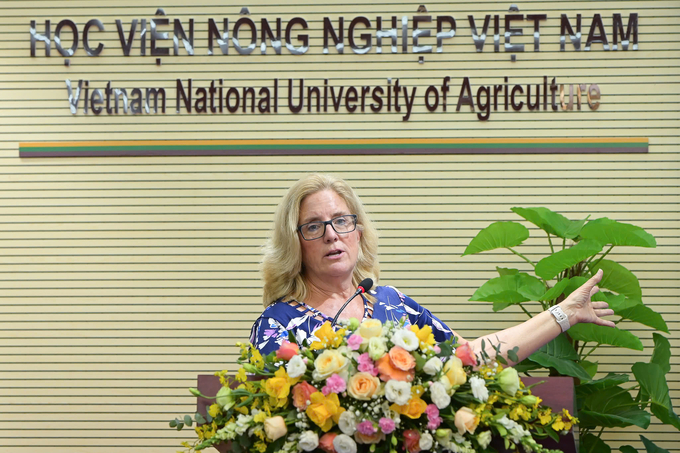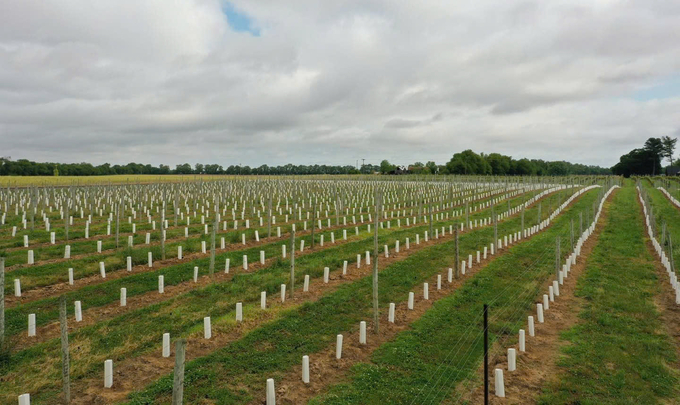May 30, 2025 | 16:44 GMT +7
May 30, 2025 | 16:44 GMT +7
Hotline: 0913.378.918
May 30, 2025 | 16:44 GMT +7
Hotline: 0913.378.918

Ms. Jennifer H. Schmidtt speaking at the event on August 12. Photo: Tung Dinh.
Ms. Jennifer reports that her farm conducts a variety of initiatives to advance the status of women in agriculture. These initiatives include the diversification of cultivation activities for various plants, including those used for animal fodder, vegetables, wheat, and fruit varieties like grapes.
In the United States, there is a group of volunteer farm women called Common Ground, as Jennifer explains. The knowledge and experiences shared by other women farmers in other states and countries are what truly serve the development in agriculture.
Jennifer provides the following information regarding the technologies employed to operate the farm and the development of products that meet market demands: "We have a variety of computer screens and monitors for both planting and recording the data we collect on the farm for record-keeping and other purposes." This includes our tractors, planters, spreaders, and harvesters.
However, mobile phone is the most critical piece of technology that she carries in my pocket. It is the primary method by which they maintain records, calculate the decisions regarding cultivation activities, and respond to market demands. They employ it continuously for all aspects of their agricultural operations.
Which are the most critical tasks to focus on: note-taking, calculating the number of growing degree days, or monitoring the markets? She is confident that this remains the case for all individuals, as nearly everything is conducted via telephone these days.

Jennifer H. Schmidt operates a farm spans a couple thousand acres—about 800 hectares—a scale that is impressive by any standard.
"We have transitioned to an online application known as Evernote for our record-keeping. We have a variety of products. I can ascertain the precise actions they took, the row spacing, and the significance of this information by following the family members in the sprayer and utilizing the notes they have taken. Jennifer provided information regarding the dates and varieties of seeds that were planted, as well as the fields in which they were planted, in order to illustrate how they implement technologies in their agricultural operations", Ms. Jennifer said.
In addition, Jennifer contends that one of the most critical details in relation to crop production is the fertilizer records, which are associated with water quality issues. Nutrient management is a system in which farmers are restricted in the quantity of nitrogen or phosphorus they may apply to their crops.
The irrigation records are the final section. The state has granted permission for all of the farm's wells. Again, it serves as an additional record-keeping function, as the state and federal governments request information from Jennifer's farm annually. Therefore, they have irrigation systems equipped with meters that indicate the quantity of water consumed to irrigate a specific field.
"Climate Field View is one of the applications that we utilize the most. Additionally, this application is primarily intended for agricultural purposes. It is employed to generate reports for our harvesters, planters, and sprayers. It is possible that a herd of deer entered the area and consumed all of the vegetation. There are numerous potential explanations for the minimal biomass present in the environment. It may be a fungal disease, a disease that has recently entered, or something that is beginning to defoliate", she stated.
However, it is possible to observe the actual events that are occurring in the field. However, this is one of the methods by which technology assists them in understanding the current state of various disciplines, according to Jennifer.
Jennifer H. Schmidt operates a farm spans a couple thousand acres—about 800 hectares—a scale that is impressive by any standard, particularly in comparison to farming operations in many other parts of the world. She explains ealier noted that her farm is highly mechanized noting that this level of automation is essential for managing such a large area.
Jennifer H. Schmidt (Sudlersville, Maryland): Originally trained in a medical specialty, Jennifer currently runs Schmidt Farms Inc., a Certified Agricultural Management farm spanning over 800 hectares, where she cultivates corn, soybeans, wheat, vegetables, and wine grapes. She is also a licensed expert in pesticide application and nutrient management.
Jennifer serves as the Director of Schmidt Farm and is a communication consultant specializing in agriculture and nutrition. She provides expertise and training programs on agricultural production, biotechnology, agricultural systems, and sustainable development.
Previously, Jennifer owned Schmidt Vineyard Management LLC and worked as a Registered Dietitian Nutritionists (RDNs) for healthcare and educational organizations, with extensive experience in clinical nutrition and youth education initiatives. She holds a Master’s degree in Human Nutrition from the University of Delaware, with advanced training in dietetics and agriculture.

(VAN) Vaccinating juvenile pangasius helps reduce disease, antibiotic use, and farming costs, increasing profits for export-oriented farmers in An Giang.

(VAN) Due to a limited supply of workforce and competitive recruitment requirements, businesses struggle to retain talented veterinary human resources.

(VAN) WOAH’s guidance aims to mitigate disease risks through a One Health approach that balances economic, conservation, and public health interests.

(VAN) Ms. Nguyen Thi Dung, Deputy Director of Ngoc Hoang Cooperative, shared about the journey of bringing dragon fruit to Europe, achieving annual revenues in the billions of VND.

(VAN) Bamboo products from Thang Tho Bamboo Cooperative have reached many countries around the world, while also creating jobs for local workers.

(VAN) The Management Board of Con Dao National Park reported that a green sea turtle, tagged in the Philippines, has traveled thousands of kilometers to lay 84 eggs on Bay Canh Islet.

(VAN) Green technology is paving a new path for sustainable aquaculture in the Mekong Delta in particular and across the country in general, helping reduce emissions and adapt to climate change.